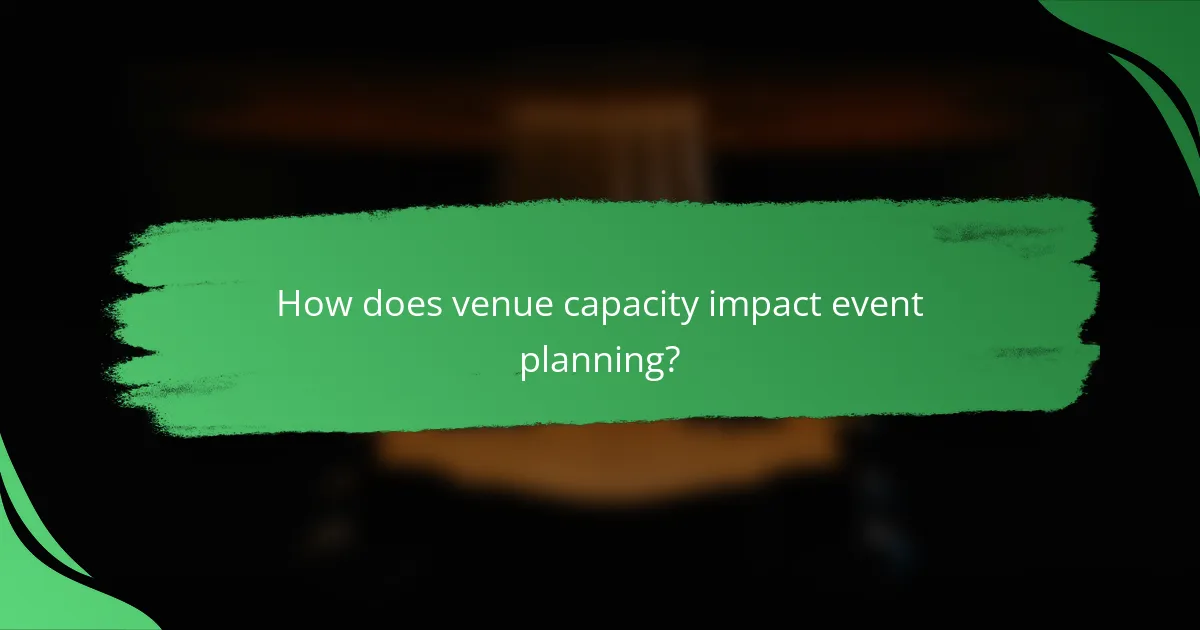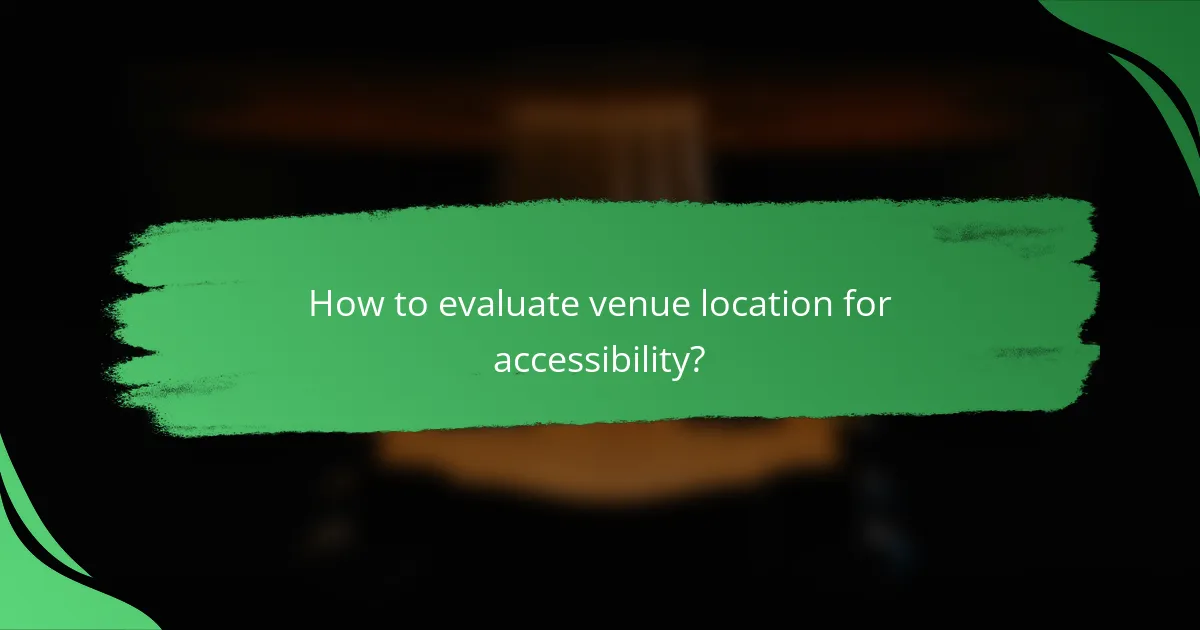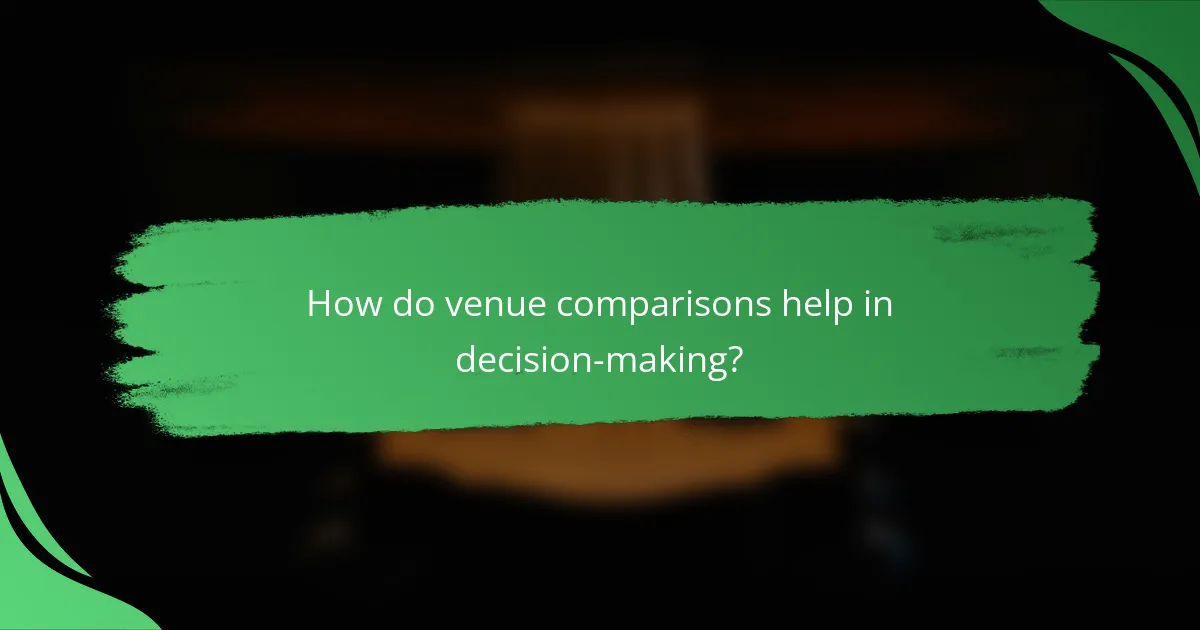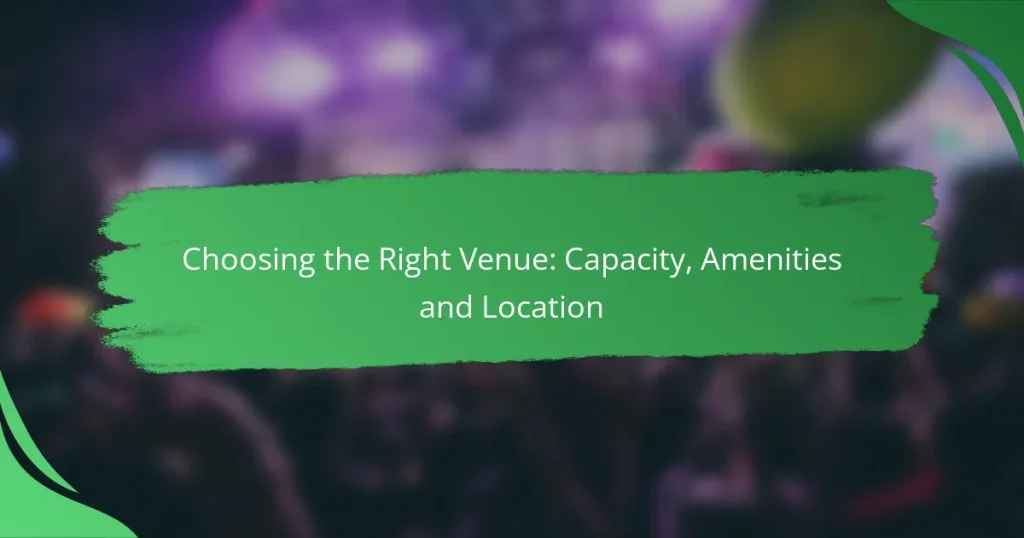Choosing the right venue for your event is essential, especially in a bustling city like New York. Key factors to consider include capacity, which ensures comfort for your guests, as well as amenities that enhance the overall experience. Additionally, the venue’s location can significantly impact attendance and accessibility, making it crucial to select a site that meets all your event’s needs.

What are the key factors in choosing a venue in New York City?
When selecting a venue in New York City, the main factors to consider are capacity, amenities, and location. Each of these elements plays a crucial role in ensuring that your event runs smoothly and meets the needs of your guests.
Capacity requirements
Capacity is a fundamental aspect of venue selection. It’s essential to choose a space that can comfortably accommodate your expected number of attendees without feeling overcrowded. For events in NYC, venues typically range from intimate spaces for a few dozen guests to large halls that can host several hundred.
Consider the layout of the venue as well; a space with flexible seating arrangements can enhance guest interaction. Always confirm the maximum capacity and any restrictions that may apply, especially for events requiring specific setups like dining or presentations.
Amenities offered
Amenities can significantly enhance the experience of your event. Look for venues that provide essential services such as audio-visual equipment, catering options, and Wi-Fi access. Some venues may also offer additional features like on-site parking, outdoor spaces, or unique decor.
Evaluate what amenities are included in the rental fee versus what comes at an extra cost. This can help you stay within budget while ensuring that all necessary services are available for your guests.
Location accessibility
Location is critical when choosing a venue in New York City. Ensure that the venue is easily accessible by public transportation and has adequate parking options for those driving. Proximity to hotels and other amenities can also be a plus for out-of-town guests.
Consider the neighborhood’s safety and vibrancy as well, as these factors can influence your guests’ overall experience. A centrally located venue can make it easier for attendees to arrive on time and enjoy the event without logistical stress.

How does venue capacity impact event planning?
Venue capacity is crucial in event planning as it determines how many guests can comfortably attend. Selecting a venue that aligns with your expected attendance helps ensure a successful and enjoyable experience for all participants.
Guest list considerations
When planning an event, consider your guest list size carefully. A venue should accommodate your expected number of attendees without feeling overcrowded or too sparse. For instance, if you anticipate 100 guests, look for venues that can hold at least 120 to allow for movement and comfort.
It’s also wise to account for potential last-minute additions to your guest list. Aim for a venue that can handle a 10-20% increase in attendance to avoid issues on the day of the event.
Space for activities
Beyond just seating, think about the activities you plan to host. Will there be presentations, networking sessions, or entertainment? Each of these requires additional space, so ensure the venue can accommodate these needs without compromising comfort.
For example, if you plan to have a dance floor or breakout sessions, choose a venue with flexible space options. A good rule of thumb is to allocate about 10-15 square feet per person for activities to ensure everyone can participate comfortably.

What amenities should be prioritized for events?
When choosing a venue for events, prioritize amenities that enhance the attendee experience and ensure smooth operations. Key amenities include audio-visual equipment, catering options, and reliable Wi-Fi availability.
Audio-visual equipment
Audio-visual equipment is essential for presentations, performances, and overall engagement. Look for venues that provide high-quality projectors, sound systems, and microphones. Ensure the equipment is compatible with your devices and inquire about on-site technical support.
Consider the layout of the space as well; a venue with multiple screens or a sound system that covers the entire area can significantly improve visibility and audibility for attendees. Check if the venue can accommodate specific needs, such as live streaming or video conferencing.
Catering options
Catering options can greatly influence the success of your event. Choose a venue that offers a variety of menu choices, including dietary accommodations for guests with allergies or preferences. Buffets, plated meals, or food stations each create different atmospheres, so consider what aligns best with your event’s theme.
It’s also important to discuss pricing structures, such as per-person costs or package deals, to stay within budget. If the venue allows outside catering, this can provide additional flexibility in menu selection and pricing.
Wi-Fi availability
Reliable Wi-Fi availability is crucial for both attendees and organizers. Ensure the venue provides high-speed internet access, as many participants may need to connect for work or share content on social media. Ask about the maximum number of devices that can connect simultaneously to avoid disruptions.
Consider whether the Wi-Fi is complimentary or if there are fees involved. Some venues may offer different tiers of service, so clarify what is included and if upgrades are available for larger events.

How to evaluate venue location for accessibility?
Evaluating a venue’s location for accessibility involves assessing how easily guests can reach it. Key factors include proximity to public transport and parking availability, which significantly impact the overall convenience for attendees.
Proximity to public transport
When selecting a venue, consider its distance from public transport options such as buses, trains, or trams. A venue located within a short walk—ideally under 10 minutes—from a major transport hub can enhance accessibility for guests relying on these services.
Check the frequency of transport services during the event times. Venues near high-frequency routes or major stations are preferable, as they reduce waiting times and improve guest flow.
Parking availability
Assess the parking options available near the venue. A venue with ample parking space can accommodate guests who prefer to drive. Aim for venues that offer at least a few dozen parking spots, especially for larger events.
Consider the cost of parking as well. Venues that provide free or reasonably priced parking can significantly enhance accessibility. It’s also beneficial to check for designated accessible parking spaces for guests with mobility challenges.

What are the best venues for corporate events in Los Angeles?
Some of the best venues for corporate events in Los Angeles include The Ritz-Carlton and the Los Angeles Convention Center. These locations offer a combination of capacity, amenities, and convenient locations that cater to various corporate needs.
The Ritz-Carlton
The Ritz-Carlton is renowned for its luxurious atmosphere and exceptional service, making it an ideal choice for high-end corporate events. With flexible meeting spaces that can accommodate small gatherings to larger conferences, this venue provides a sophisticated setting that impresses attendees.
Key amenities include state-of-the-art audiovisual equipment, high-speed internet access, and on-site catering options featuring gourmet cuisine. The Ritz-Carlton also offers stunning views of the city, which can enhance the overall experience for your guests.
Los Angeles Convention Center
The Los Angeles Convention Center is a versatile venue that can host a wide range of corporate events, from trade shows to large conferences. With over 800,000 square feet of exhibit space, it can accommodate thousands of attendees, making it suitable for major industry gatherings.
This venue is equipped with modern facilities, including advanced technology for presentations and ample parking options. Its central location near downtown Los Angeles ensures easy access for both local and out-of-town guests, which is a significant advantage for corporate planners.

What are the top venues for weddings in Chicago?
Chicago offers a variety of stunning venues for weddings, each with unique features and capacities. When selecting a venue, consider factors such as guest capacity, available amenities, and the overall location to ensure it aligns with your vision and needs.
The Art Institute of Chicago
The Art Institute of Chicago is a renowned venue that combines art and elegance, making it a unique choice for weddings. With spaces like the Modern Wing and the Ryan Education Center, couples can host intimate gatherings or larger celebrations with a capacity of up to 300 guests.
When planning a wedding here, consider the stunning backdrop of world-class art, which can enhance your ceremony and reception. Be mindful of the venue’s policies regarding catering and decor, as they may have specific guidelines to maintain the integrity of the space.
Chicago Botanic Garden
The Chicago Botanic Garden provides a picturesque setting with lush landscapes and vibrant flowers, ideal for outdoor ceremonies and receptions. This venue can accommodate various group sizes, with options for both small gatherings and larger parties of up to 400 guests.
Utilize the natural beauty of the gardens for your wedding photos and consider the seasonal changes that can affect the scenery. It’s advisable to book well in advance, especially during peak wedding seasons, to secure your preferred date and location within the garden.

How do venue comparisons help in decision-making?
Venue comparisons streamline the decision-making process by providing clear insights into capacity, amenities, and location. By evaluating multiple options side by side, you can identify the best fit for your event’s specific needs and budget.
Capacity considerations
When selecting a venue, capacity is crucial. Ensure the space can comfortably accommodate your expected number of guests, allowing for movement and any additional setups like stages or dining areas. A good rule of thumb is to allow for 10-15 square feet per person for seated events.
Consider the layout as well. Different configurations, such as theater, banquet, or classroom styles, can affect how many people can fit in the same space. Always check the venue’s maximum capacity and compare it against your guest list to avoid overcrowding.
Amenities to evaluate
Amenities can greatly enhance the attendee experience. Look for essential features like audio-visual equipment, Wi-Fi access, and catering options. Some venues may offer additional services such as event planning assistance or on-site accommodations, which can save time and effort.
Compare what each venue provides. For example, a venue with in-house catering may offer package deals that could be more cost-effective than hiring external services. Make a checklist of must-have amenities and prioritize them based on your event’s needs.
Location factors
The location of your venue can significantly impact attendance. Choose a site that is easily accessible, ideally near public transportation and major roads. Consider the surrounding area for parking options and nearby accommodations for out-of-town guests.
Evaluate the venue’s neighborhood. A location in a vibrant area may enhance the overall experience, while a remote venue could deter attendance. Always factor in the convenience for your guests when making your final decision.


